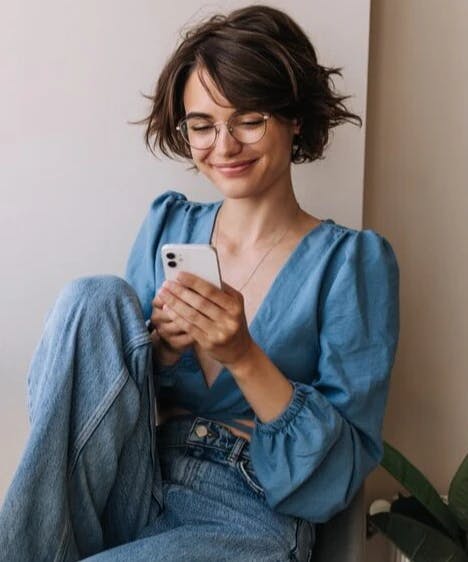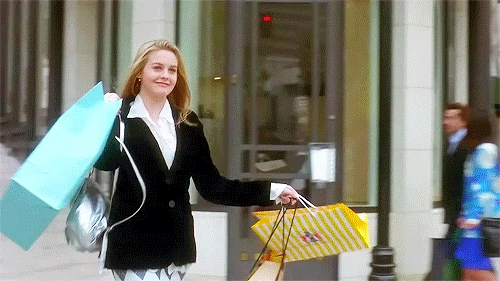What People Are Getting Really Right And Really Wrong About De-Influencing
You’re scrolling, scrolling, scrolling, and finally a post piques your interest. Perhaps it’s a beautiful young woman twisting open a bottle of lip gloss and swiping the doe-foot applicator across her plump lips. The vibes are immaculate. You feel a flush of longing for that woman to be you. And then you see that she linked the product. It could be yours if you just click through to the storefront. The question is: How often do you click through?

Influencer marketing is ridiculously effective because we, the consumer, trust real-life people who appear to achieve enviable results by using trendy, desirable products. Especially if you’re a part of Gen Z, you may aspire to be just like them because you’re the generation who places the most trust in influencers, so naturally marketers exploit this near-infallible trust.
The antidote? De-influencing. The hottest new trend taking over TikTok and Instagram Reels alike is de-influencing, where girls get candid airing grievances about cult favorites, popular products, and even lifestyle activities that influencers convince us are the holy grail. But is de-influencing really just a rebranded version of influencing? Let’s chat.
Au Revoir to the Days of “TikTok Made Me Buy It”
Beauty and lifestyle creators are slamming cult classics left and right, calling them products that “aren’t really worth the hype.” Nothing is safe: L’Oreal Paris Telescopic Lift Mascara, Dior Backstage Rosy Glow Blush, Charlotte Tilbury’s Hollywood Flawless Foundation, Anastasia Beverly Hills Modern Renaissance eyeshadow palette, Paula’s Choice 2% BHA Liquid Exfoliant, The Ordinary Hyaluronic Acid serum, and many more. One TikTok user even called a Mario Badescu face cream a “monstrosity,” while another user called the Pixi Blush Sticks the “tackiest” blush she had ever used.
One queen of de-influencing has emerged among the masses: Bethenny Frankel, notorious The Real Housewives of New York City alum, television personality, and founder of lifestyle brand Skinnygirl.
“Girl don’t do it. It’s not worth it,” Frankel captioned one de-influencing video where she discouraged girls from spending their money on a Hermès lip balm or Hourglass mascara.
Frankel has been a vocal advocate against luxury products that don’t – in her experience – offer luxury results. She roasted the viral MAKEUP BY MARIO SoftScuplt Transforming Skin Enhancer, suggesting that people instead spend their money on the Kevyn Aucoin Glass Glow Face and Body Gloss, and insists that the Drunk Elephant D-Bronzi Anti-Pollution Sunshine Drops is a “totally fine” product but overhyped and can be swapped out for a Dollar General bronzer mixed with Ponds Cream. She also claimed that Saie’s bronzer, among other overhyped bronzers, could be swapped out for a brand easily found in health food stores, Dr. Hauschka.
Aside from cosmetics themselves, Frankel revealed that she doesn’t always purchase expensive makeup brushes. In fact, she admitted that she has used “cheapo” brushes for over a decade. Frankel called the $4 brushes she purchased from Shein “excellent,” the E.L.F. precision brushes “high end,” praised REAL TECHNIQUES, and crowned NYX brushes as the winner. According to Frankel, you don’t need to spend a ton of money on makeup brushes.
Her videos even debunk other viral trends with a characteristically humorous take, like Frankel’s de-influencing video on the 30 oz. and 40 oz. Stanley Quencher mugs that seem like a requirement to own if you exist within the influencer world.
“This is easily the most stupid thing that people were obsessed with buying,” she said. “Give it to the hockey players when they win the Stanley cup ‘cause they’re the only ones dehydrated enough after a game to need something so stupid.”
Honestly, her takes on luxury or simply expensive viral products are refreshing, given her wide audience. Frankel could easily just flaunt her wealth and gatekeep her opinions, but instead, her candidness on social media has opened up a dialogue across many platforms about which products are simply not worth the hype.
Most De-Influencing Is Just a Shiny New Replacement for Influencing
Like Frankel, some people hopping on the trend to recommend replacements while others simply try to dissuade people from purchasing items they don’t need. On face value, it’s a refreshing take to see people confronting overconsumption head-on. Americans have it bad, but if you take a look at the issue worldwide, you can see we’ve all got a bit of a shopping addiction. In China, livestream shopping festivals wrangle in upwards of $7.5 billion in transactions, and one Chinese influencer Viya even managed to push $1 billion in sales for goods. Here in America, we’re enchanted by cheap Chinese goods sold on apps like Wish’s new rival Temu, which was heavily marketed during the 2023 Super Bowl, and we swear by our Amazon Prime memberships to get us the goods we see on social media ASAP.

So let’s be honest with ourselves: Is the trendy “resistance” against influencer marketing really going to change much about our overindulgent, consumerist culture? Or is it simply the opposite side of the same coin? If you’re watching a video where a girl (who probably has good intentions) bashes one product and tells you that a different one is better, aren’t you still being influenced? Sure, you might save a penny or two if you’re resisting the hype to buy a $65 Hourglass Veil Powder Brush and instead only spend around $30 on an entire set of REAL TECHNIQUES makeup brushes, but you’re really just funneling money into the pockets of another company or corporation.
It’s actually not very revolutionary to present the public with your “hits and misses” for products. Having watched beauty videos on YouTube since the early emerging stars like Michelle Phan originally made a name for themselves, I’ve seen YouTubers give their niche audiences opinions on which products were on their “hits list” and which made their “sh*t list.”
Furthermore, micro-influencers on social media who hop on the de-influencing trend may not realize the amount of power they wield. Marketing experts predict that micro-influencers will end up with more influence over consumer behaviors than celebrities in the near future. This may be due to the “cult of personality” which draws us in, a concept called parasocial relationships, where people repeatedly exposed to a media persona develop illusions of friendship, identification, and intimacy. We get sucked into loving these personas, and while parasocial interactions aren’t always necessarily a bad thing, it’s probably a good practice to maintain mental autonomy and personal ownership over your thoughts and feelings.
Don’t Just Get De-Influenced, Set Personal Boundaries
If micro-influencers are de-influencing by re-influencing, how will we ever reduce our worsening shopping addiction? The key is intentionality.
It’s okay to want to have some fun and try out products that will make you feel good. Even Bethenny Frankel went on record in one of her videos expressing how it’s okay to want to feel special. If that special feeling comes from a high-end product, then so be it. And if you can still get those good vibes from a cheaper choice, then you’re free to walk that path.
Haul videos get littered across your FYP where girls unbox dozens of products from Amazon, Shein, Zara, Sephora, Ulta, and more. You’re meant to get sucked into these videos, covet the items, and go make purchases of your own, even if the girls who post them really mean no harm. Again, it’s not a bad thing if you come across a girl testing out the new NYX Cosmetics Milky Gloss lip products, and you’re in the market for new lip gloss so you take her recommendation. You just have to be aware of how far you let yourself become influenced. If you’re not putting away enough into savings or your investment portfolios because you’ve accumulated a bunch of debt with Afterpay and Klarna, then maybe it’s time to have a personal intervention.

Here’s where setting personal boundaries comes into play for smart shopping. In my humble opinion, you can (and should) buy things because life is too short not to have fun. One way that I’ve prevented myself from overconsumption is by simply not having shopping apps on my phone. It’s really quite simple: If I can’t access my Amazon account and make a hasty purchase after I’ve tapped a link from an Instagram story, then I instead have to wait until I’m at my laptop to even buy the item.
This works well for me because it hits on the second habit I’ve sworn by: pausing before I purchase. Practicing mindfulness around the goods and services you want is critical. I’m a pretty impulsive person, so I know that if I get an idea in my head, I’m too likely to act on it. Instead, if I see a product I want, I bookmark it, set it in a different browser tab, or add it to my Notes app and then give myself some breathing room before I actually add anything to my cart. After this cool-off time, I’m much less likely to think “I need it!” and spend money irresponsibly.
My final word of advice for personal boundaries with your shopping habits is to be really mindful of the way companies and influencers market a product. We all kind of roll our eyes when the company itself uses extreme language to tout how incredible their product is, so why don’t we feel a similar sense of alarm when we hear influencers make major claims that a hair oil changed their life or that they’re absolutely “shook” by the results they saw after eating collagen gummies for a week? We all exaggerate here and there, so instead of letting exaggeration lead us to believe that a particular product is our next holy grail, we should really do some digging through product information and a variety of reviews to see if that product is the right one for us in the first place.
Closing Thoughts
Retail therapy has its pros, but they can quickly be outweighed by their cons. As a fellow Gen Z girl to my zoomer and millennial cohorts, I’m insisting that you become more discerning about what you buy and not fall into quick consumerist behavior. We’ve been deemed the age group of “trendy impulse buyers” for a reason, but only you hold the power to truly become de-influenced. Carving out a uniquely beautiful identity is one of the most fun parts of womanhood. You can still find inspiration from other ladies without getting into parasocial relationship territory, relying on their online persona to make the final decision before you hit the “check out” button on your online shopping cart.
Don’t miss anything! Sign up for our weekly newsletter and get curated content weekly!